My father, were he still alive would be 120 today, born in December 1899, just before the start of the 20th century (though for mathematicians that only started on 1st January 1901) and I often reflect on the changes he saw in his lifetime, and even more since his death 34 years ago.
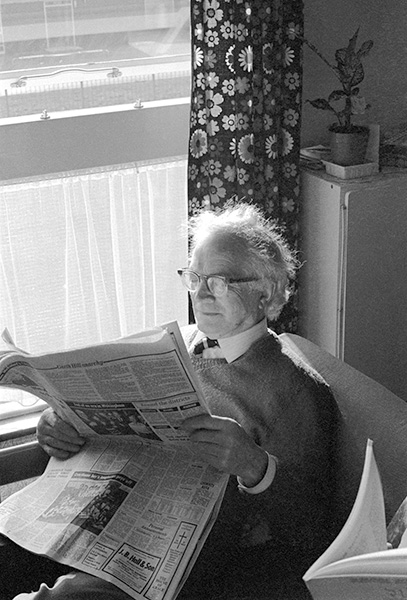
Dad grew up in Hounslow, not far from the barracks of what was an important military town. The cavalary barracks there were the first of 40 new barracks built following the French revolution when there were strong fears both of the population here rising up in a similar manner and of a French invasion. Many of the buildings on the site, currently occupied by the Irish Guards, are listed and are expected to be retained when the site is redeveloped for housing in a few years time.
But Hounslow was also important as a coaching town, its High St allegedly lined by a hundred pubs, with the Bell junction being where the road from London to Bath and that to the Southwest diverged. Of course the coach traffic had gone by his birth, taken to rail, but these were still busy roads, though busy with horse and carts, with motorised vehicles only just begining to appear. Dad’s father had a business making horse-drawn carts, and the motor vehicles killed both his business and him when he turned right into the house gateway in front of a car whose driver pleaded he had been unable to stop.
As a two-year old he will have seen the new Electric tram which was extended to Hounslow, and later came to run past the house he lived in on the Staines Road. In 1935 the trams were replaced by trolley buses, and then these In a few years time the buses which now run there will again be electric.
At five he will have seen the building of a grand new Council House, Public Library and Swimming Baths in Treaty Road, and he lived long enough to see a new civic centre built in 1975, dying around the time the grand Edwardian buildings were demolished to build a rather undistinguished shopping centre. Now the civic centre is being redeveloped for housing and the council have moved into a rather snazzy new building on the Bath Road close to The Bell.
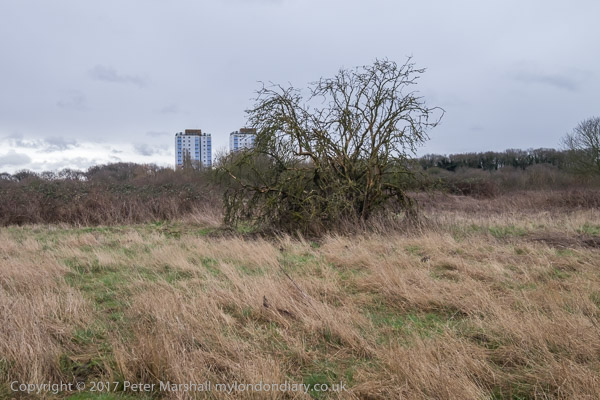
Just down the road from their house was Hounslow Heath, the site of one of London’s first airports. Dad and the other kids used to go down to watch the early aircraft take off and land, and always claimed to have seen Bleriot there and to have been told off by him for touching his plane. I doubt it was really Bleriot, but there were certainly other early aviators there in 1909 and later years.
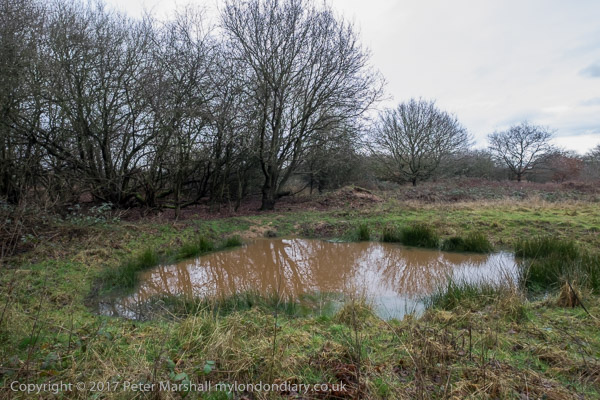
Then came the war. At the start Dad was too young and worked in the drawing office of a munitions factory (women did the real work) and I think in a few other factories, but eventually when old enough decided army life would be easier. He wasn’t conscripted – I think because he was a skilled worker – but decided to volunteer. At the medical the officer who examined him told him his complete deafness in one ear (probably a result of factory work) meant he should fail him, but if he wanted to enlist he would ignore it.
After army training where he narrowly missed being court-martialled and probably shot for insuborordination the army got rid of him to the Royal Flying Corps and he went to France mending planes and finally running the stores in a camp in Germany (by now in the RAF) after the war had ended, again getting himself in a little trouble, this time for fraternising with the enemy.
I think he was probably back in Hounslow for when the first commercial flights took place from Hounslow Heath in 1919, and certainly for later in the year when the daily services began. In 1919 it was the only airport in the UK with customs facilities and there were regular flights to Paris, Amsterdam and Leeds.
By the time the BBC was established in 1922, Dad and his brother were listening-in on their crystal sets – and soon a primitive radio powered by a Daniell cell, which still I found in his workshop when I was young.
I doubt if Dad was there on 30th May 1925 when King George V cut the ceremonial ribbon to open the newly completed Great West Road, half a mile or so to the north of his home, the first of a number of new road schemes designed for motor vehicles – though also provided with separate cycle tracks in both directions, but he certainly rode on the cycle tracks and, on a motorbike, on the roads.
Dad cycled everywhere, except when he walked. West Middlesex still had plenty of country lanes in the 1930s, including those through the orchards of Heathrow, a small hamlet south of the Bath Road. When he had a young family he bolted a sidecar onto his push-bike to carry the kids, though by the time I was around the sidecar was rusting in the shed. The motorbike had long gone too, and he never owned a car. He had a hand-cart which he used to carry ladders, building materials, bee hives and other heavy goods for his various jobs.
He cycled all over Middlesex during the Second World War inspecting bee hives for foul brood; people were encouraged to take up bee-keeping as part of the campaign to grow more food at home, and had to be taught to keep their hives disease-free. We grew up self-sufficient for vegetables, from our own garden, his mother’s garden and an allotment, together with a wide range of fruit, apples, pears, plums, raspberries, blackberries, redcurrants, blackcurrants, gooseberries and more peaches than we could eat from a couple of trees he grew from stones. And of course honey. I took my turn at the handle of the extractor watching it flow into the 28lb tins. At home it often came with the odd bees leg or wing in it, doubtless adding to the flavour.
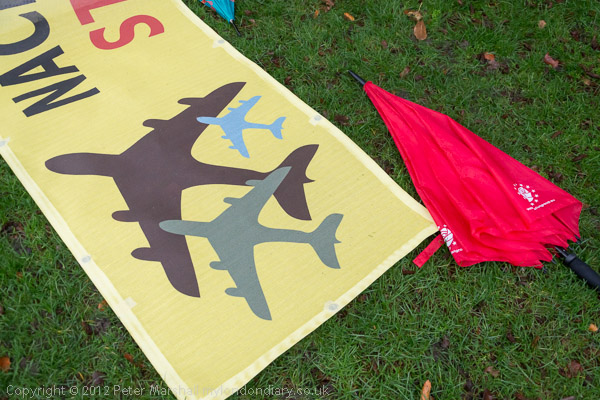
Heathrow Airport was established towards the end of the war with the industry telling the lie it was needed for military purposes, when all the time it was being established to be London’s civil airport. At first it was small, a few tents on the Bath Road, but in the fifties it grew and larger, heavier and noiser planes began to use it. Replacing the DC3s with large propellor aircraft was not too bad, and I stood in my back garden crossing off their numbers in my aircraft spotters book. But when the jets came in you needed ear protectors. More lies were told to get each stage of expansion. Terminal 4 would be the last terminal ever needed. Then came T5 and the ‘third runway’. But by around 1971 Dad had had enough of the noise and been driven away. Away from so many people and places he knew.
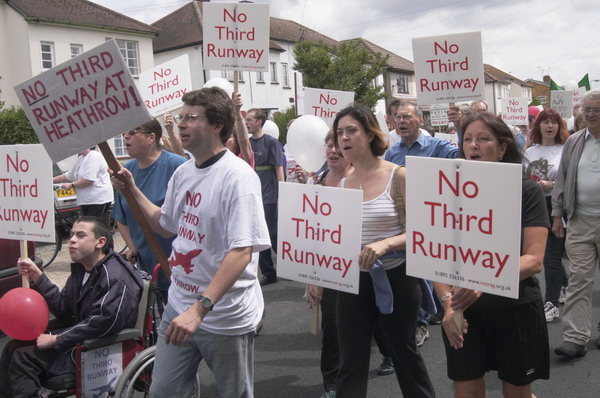
After the war (when he also did his bit fire-watching) came the welfare state – the NHS and free education which I and my siblings benefitted from. NHS dentistry came too late for Dad, who together with his bride had been given a “full set” as a wedding present back in 1932. I was born before the NHS, but did get regular visits to the clinic with free orange juice and cod liver oil once it began.
Things have of course continued to change since then. We got a washing machine to replace the old boiler and mangle. Dad put in a hot water system with an immersion heater, though in winter it was still heated by the coal fire in the living room – which now had to burn smokeless fuel. The old stone sink went, to be replaced by a stainless steel sink unit. A fridge – our first was gas powered. Finally we got a television though Dad still preferred the radio (and so do I – we don’t have TV at home now.) A record player (mainly for me and bought on HP).
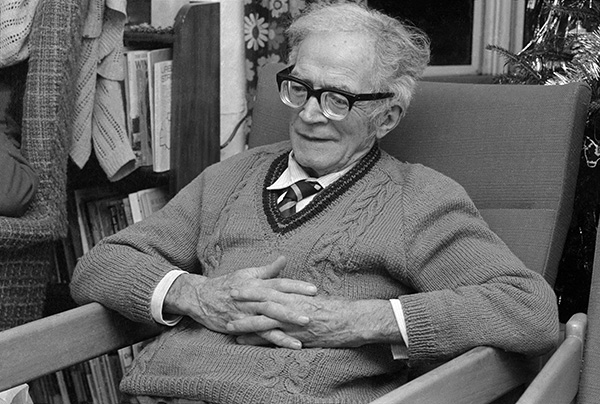
Later came computers; the Internet and World Wide Web and mobile phones. But by then Dad was no longer with us.
All photographs on this and my other sites, unless otherwise stated, are taken by and copyright of Peter Marshall, and are available for reproduction or can be bought as prints.
There are no adverts on this site and it receives no sponsorship, and I like to keep it that way. But it does take a considerable amount of my time and thought, and if you enjoy reading it, please share on social media.
And small donations via Paypal – perhaps the cost of a beer – would be appreciated.